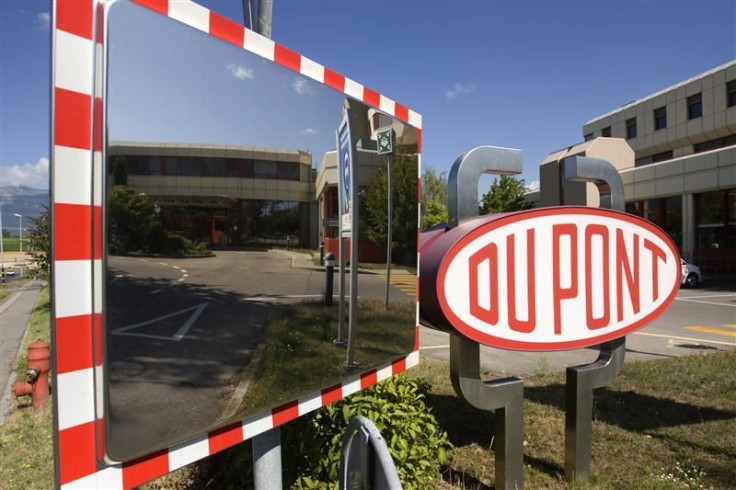U.S. Prosecutors Accuse China of Industrial Espionage Plot Against DuPont

(Reuters) - Federal authorities successfully kept a U.S. businessman in jail Wednesday ahead of his trial for trade secret theft, and argued that it was Chinese government representatives who directed him to obtain valuable technology manufactured by chemical giant DuPont.
Walter Liew, a U.S. citizen, and his wife, Christina Liew, were indicted last year on three counts each, including witness tampering, making a false statement and conspiracy to tamper with witnesses and evidence.
Now newly released court documents from prosecutors provide fresh details about Walter Liew's alleged links with the Chinese government. They name, as one of the Chinese representatives who met with him, a high-ranking Communist Party official who later became a member of the Politburo.
Liew, 54, and his wife have pleaded not guilty, and he was held without bail and his wife released, court documents show.
On Wednesday, he appeared in a yellow prison jump suit at a San Francisco federal court hearing where U.S. Magistrate Judge Nathaniel Cousins rejected defense attempts to obtain his release.
Liew attorney Thomas Nolan maintained in court that Liew had only possessed publicly available information.
There is nothing at all illegal about that conduct, Nolan said. What is illegal is if he uses trade secrets.
Liew paid at least two former DuPont engineers for assistance in designing chloride-route titanium dioxide, also known as TiO2, according to the indictment. DuPont is the world's largest producer of the white pigment used to make a range of white-tinted products, including paper, paint and plastics.
The United States has identified industrial spying as a significant and growing threat to the nation's prosperity. In a government report released last November, authorities cited China as the world's most active and persistent perpetrators of economic espionage.
Technology analyst Mark Anderson, who has spoken on Chinese trade policy and spying for years, said he had never seen a member of the Politburo named in an espionage case before. He said the DuPont case was all the more remarkable because the main thrust of the case was economic, not military.
This is their most valuable trade secret in the world of paint, he said, noting that the DuPont division in question reported $6 billion in revenue in 2010.
Liew was hosted at a banquet in 1991 by Luo Gan, who at the time was a high-ranking official of the Communist Party of China Central Committee, according to correspondence from Liew that U.S. federal officials say they seized from his safety deposit box. Luo Gan went on to become a member of the nine-member Standing Committee of the Politburo, prosecutors wrote in the filing.
Several other Chinese officials also attended, according to the documents.
The purpose of the banquet is to thank me for being a patriotic overseas Chinese who has made contributions to China, Liew wrote in a memo to a Chinese company, according to U.S. prosecutors, and who has provided key technologies with national defense applications, in paint/coating and microwave communications.
Luo Gan gave Liew directives at the meeting, and two days later Liew received a list of key task projects, including TiO2, prosecutors stated.
In his court filing seeking bail, Liew denies he was invited to a banquet with some Chinese officials, but Luo Gan is not discussed. Prosecutors contend that Chinese companies had not been able to master DuPont's technology on their own.
Liew, however, obtained that technology from former DuPont employees and sold it to companies controlled by the PRC government, prosecutors wrote.
The Chinese embassy in Washington did not immediately respond to an email seeking comment on Wednesday.
Dupont spokesman Dan Turner said the company referred the matter to law enforcement, and will continue to take, aggressive measures to protect its proprietary, unique, and confidential technologies.
DuPont also filed a civil lawsuit against Liew last year, before he was indicted, for misappropriating trade secrets. The charges Liew now faces grew out of this case.
Liew denies obtaining or possessing any confidential, proprietary trade secret materials from DuPont regarding TiO2, according to court documents.
In seeking bail, Liew's attorneys note that he was born in Malaysia and has lived in the United States for 32 years.
The government's request for incarceration ignores the maxim that in our society, liberty is the norm, Liew's lawyers wrote.
Cousins said Liew could seek release again if he could pledge more money for bail.
The case in U.S. District Court, Northern District of California is United States of America vs. Walter Liew and Christina Liew, 11-cr-573.
(Additional reporting by Joseph Menn; Editing by Will Dunham, Gary Hill)
© Copyright Thomson Reuters 2024. All rights reserved.











